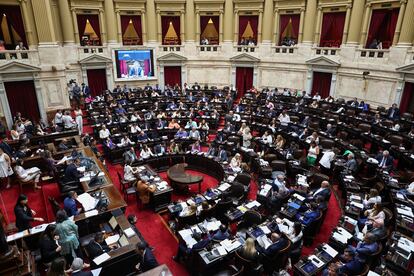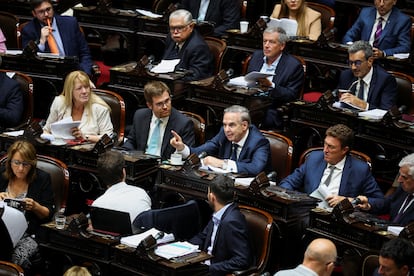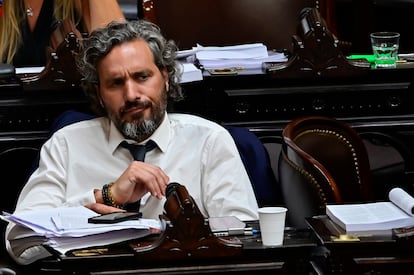Argentine Congress settles in for marathon debate over Javier Milei’s bill to dismantle the state
The deputies will discuss the reform project for at least 40 hours in an extraordinary session that began Wednesday amid protests on the streets of Buenos Aires

Since Wednesday, the Argentine Congress has been debating the refoundation of the state proposed by President Javier Milei. It was a long day in the Chamber of Deputies, where the discussions are expected to last until Friday, and a tense one in the streets of Buenos Aires, where the federal police repressed some of the thousands of demonstrators who gathered in front of the Congressional Palace.
The session began after 10 a.m. attended by 137 deputies, a little more than half of the total number who make up the lower house of Congress. The ruling party, La Libertad Avanza (LLA), needed at least 129 of the 257 deputies to show up for the debate for it to proceed. The quorum was guaranteed with the 38 seats held by LLA, the 37 of the PRO of conservative former president Mauricio Macri, the 34 of the center-right Radical Civic Union (UCR), and a large block of federal forces and other minority groups, as well as some legislators from the Peronist Union for the Homeland (UP) alliance, and of the left, who enabled the debate with their presence despite their opposition to the bill.

The debate began with the swearing in of two new deputies. Mónica Ferreyra, of the ruling party, occupied the seat freed up by Milei’s chancellor, Diana Mondino, and dedicated her assumption to “the children growing in the mother’s womb.” The Peronist Ernesto Nader Ali, on the other hand, did so for “loyalty” to his “ideological doctrine.” The formal debate had not yet begun, but tension was guaranteed. The deputies then embarked on a debate that will last at least 40 hours, while they discuss point by point the almost 400 articles of the macro-law with which Milei seeks to arrogate special legislative powers, privatize state enterprises, and deregulate the Argentine economy.
The LLA has its 38 votes and the 37 of its PRO allies guaranteed. It will, though, still have to convince some of the deputies of the UCR or the federal forces, who guaranteed a quorum but not a blank check.
At the outset of the debate, UP’s chamber leader Germán Martínez tried to have the bill returned to committee, but the proposal was rejected with 149 votes against. Another member of the bench summarized the position of the Peronist coalition: “There are no salvageable aspects. The content is contrary to the interests of the Argentine people.” The left joined the criticism. “I hope that in the days that this session lasts, many people will be in the streets,” said congresswoman and former presidential candidate Myriam Bregman. “The only language that governments understand is that of mobilization; that is the only tool that guarantees that they do not break everything into pieces.”

Congress had been fenced off early in the morning and federal security forces stood guard around the building. At around 5 p.m., when some of the people called to protest by mainly leftist organizations were demonstrating in the square in front of the Congressional Palace, the police deployment escalated. The Minister of Security, Patricia Bullrich, activated the government’s recently installed protocol to repress street blockades and the federal police beat demonstrators, fired tear gas, and deployed their forces in hydrant trucks and officers on motorcycles who pushed the protestors towards the sidewalks.
“There are detainees, there are wounded, I myself am wounded. I was dragged and scratched. And nobody assaulted any police,” said left-wing leader Eduardo Belliboni, who blamed the Minister of Security’s protocol for the incidents. “We are going to continue here. The law is going to make this an everyday thing,” he said.

The debate is being held in extraordinary sessions called by the government during the summer recess. Milei’s administration intended to give the bill, which in its original version contained more than 600 articles, a fast-track treatment but had to extend the term of the extraordinary sessions until February 15. Legislators had debated the initiative for a month in specialized commissions and after those negotiations, the bill shed almost 200 articles. The ruling party acknowledged “mistakes” in its drafting and agreed to give in on some of the points.
Milei is no longer seeking up to four years of special powers that would allow him to govern by decree, instead asking for two. He also accepted “errors” in the wording of the chapter on security, in which an article proposed controlling gatherings of more than three people in public, and has eliminated the oil company YPF from the list of the 41 state-owned companies he intends to privatize. Now 37 remain, with three others — Banco Nación, the electric power generator Nucleoeléctrica and the satellite telecommunications company ARSAT — open only to partial capitalization. Neither will the bill seek to reform the electoral system.
On Wednesday, at the beginning of the session, the articles withdrawn from the bill were read aloud: “13, 31, 71, 72, 81...” The law that emerges from the process will be revealed after one of the longest debates in the history of the Argentine Congress.
Sign up for our weekly newsletter to get more English-language news coverage from EL PAÍS USA Edition
Tu suscripción se está usando en otro dispositivo
¿Quieres añadir otro usuario a tu suscripción?
Si continúas leyendo en este dispositivo, no se podrá leer en el otro.
FlechaTu suscripción se está usando en otro dispositivo y solo puedes acceder a EL PAÍS desde un dispositivo a la vez.
Si quieres compartir tu cuenta, cambia tu suscripción a la modalidad Premium, así podrás añadir otro usuario. Cada uno accederá con su propia cuenta de email, lo que os permitirá personalizar vuestra experiencia en EL PAÍS.
¿Tienes una suscripción de empresa? Accede aquí para contratar más cuentas.
En el caso de no saber quién está usando tu cuenta, te recomendamos cambiar tu contraseña aquí.
Si decides continuar compartiendo tu cuenta, este mensaje se mostrará en tu dispositivo y en el de la otra persona que está usando tu cuenta de forma indefinida, afectando a tu experiencia de lectura. Puedes consultar aquí los términos y condiciones de la suscripción digital.








































